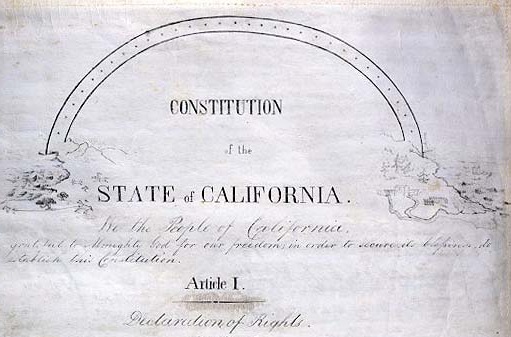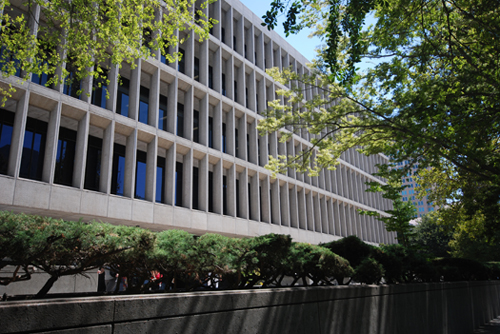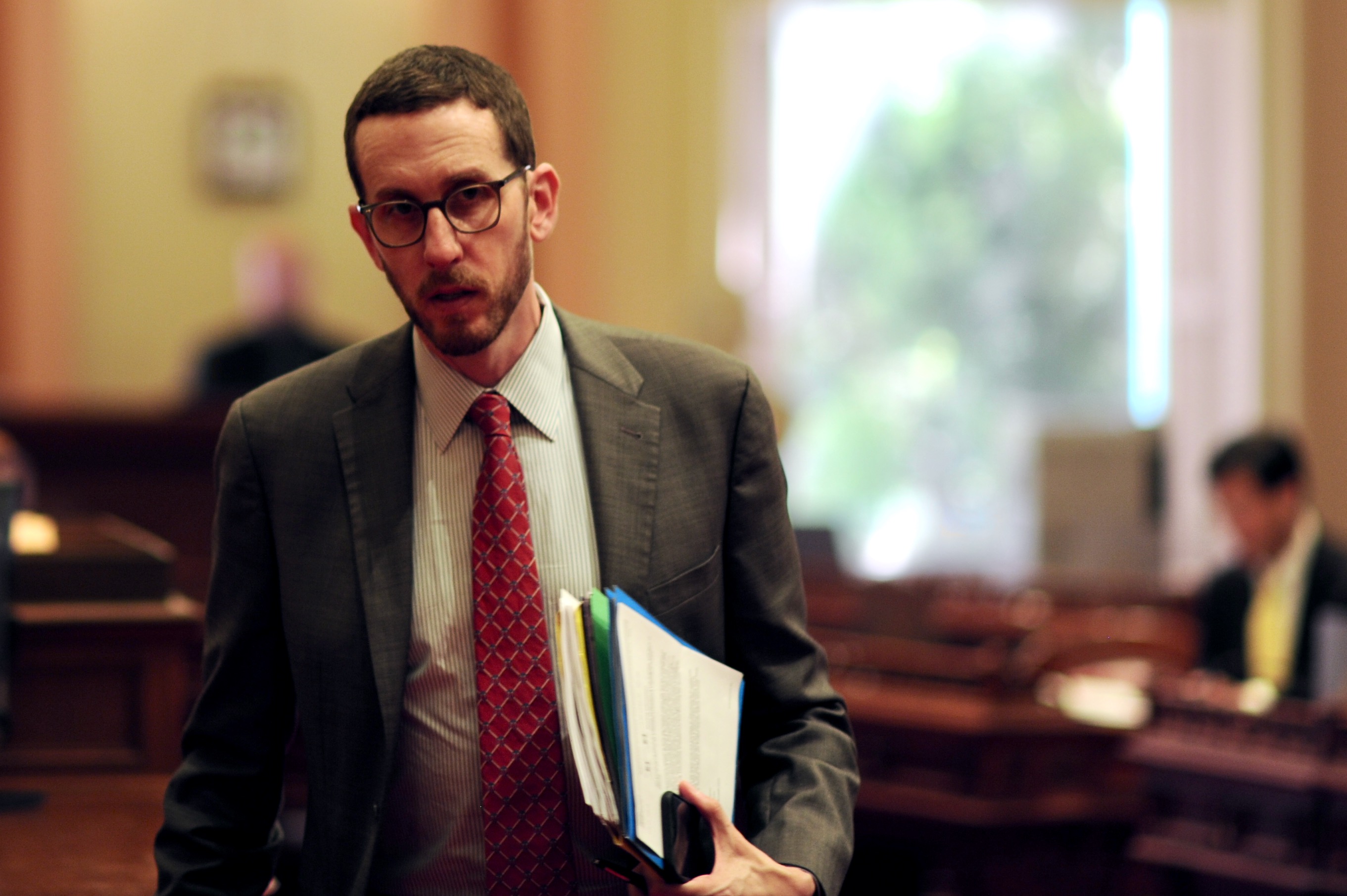
California Constitution. (Photo: www.sos.ca.gov)
Who Makes the Rules for the Judiciary?
What do you know about California’s Constitution Article VI?
By Chris Micheli, March 18, 2019 5:05 am
The judicial branch of California state government, which is the largest judicial system in the country, is provided for in Article VI of the California Constitution. There are three levels of courts in this state: superior (the trial courts), appellate (the appeals courts), and Supreme (the highest court).
The Judicial Council is the rule making entity for the judicial branch and has promulgated the California Rules of Court. There are also local rules of court. Article VI of the California Constitution sets forth the duties and obligations of the judicial branch of government. Article Six has the following provisions:
The judicial power of the state is vested in the Supreme Court, courts of appeal, and superior courts, all of which are courts of record.

The Supreme Court consists of the Chief Justice and 6 associate justices and the agreement of four judges present at the oral argument is necessary for a judgment.
The Legislature must divide the state into districts with each containing a court of appeal with one or more divisions and each division consists of a presiding justice and 2 or more associate justices. Agreement of two judges present at the oral argument is necessary for a judgment.
In each county of the state, there is a superior court of one or more judges and the Legislature prescribes the number of judges and provides for the officers and employees of each superior court. In addition, in each superior court, there is an appellate division and the Chief Justice assigns judges to the appellate division for specified terms.
The Judicial Council consists of the Chief Justice and one other judge of the Supreme Court, three judges of the courts of appeal, 10 judges of the superior courts, two nonvoting court administrators, and any other nonvoting members as determined by the voting membership of the Council, each appointed by the Chief Justice for a three-year term pursuant to procedures established by the Council; four members of the State Bar appointed by its governing body for three-year terms; and, one member of each house of the Legislature appointed as provided by the respective house. In addition, the Council appoints an Administrative Director of the Courts, who serves at its pleasure and performs functions delegated by the Council or the Chief Justice, other than adopting rules of court administration, practice and procedure.
CHRIS MICHELI DISSECTS CALIFORNIA LIKE NO ONE ELSE—ONLY ON THE GLOBE:
• Direct Democracy and California’s Constitution Article II
• The Legislature and California Constitution Article IV (part II)
• The Legislature and California Constitution Article IV (part I)
• The Governor and California’s Constitution Article V
• Everything You Thought You Knew About Lobbying is Probably Wrong
• Unique Aspects of California’s Electoral System
• Who Makes the Rules for the Judiciary?
The Commission on Judicial Appointments consists of the Chief Justice, the Attorney General, and the presiding justice of the court of appeal of the affected district or, if there are 2 or more presiding justices, the one who has presided longest or, when a nomination or appointment to the Supreme Court is to be considered, the presiding justice who has presided longest on any court of appeal.
The Commission on Judicial Performance consists of one judge of a court of appeal and two judges of superior courts, each appointed by the Supreme Court; two members of the State Bar of California who have practiced law in this State for 10 years, each appointed by the Governor; and, six citizens who are not judges, retired judges, or members of the State Bar of California, two of whom to be appointed by the Governor, two by the Senate Committee on Rules, and two by the Speaker of the Assembly.
The State Bar of California is a public corporation and every person admitted and licensed to practice law in California is a member of the State Bar, except while holding office as a judge of a court of record.
The Supreme Court, courts of appeal, superior courts, and their judges have original jurisdiction in habeas corpus proceedings. Those courts also have original jurisdiction in proceedings for extraordinary relief in the nature of mandamus, certiorari, and prohibition. Superior courts have original jurisdiction in all other causes. The court may make any comment on the evidence and the testimony and credibility of any witness as in its opinion is necessary for the proper determination of the cause.
The Supreme Court has appellate jurisdiction when judgment of death has been pronounced. When appellate jurisdiction in civil cases is determined by the amount in controversy, the Legislature may change the appellate jurisdiction of the courts of appeal by changing the jurisdictional amount in controversy.
The Supreme Court may, before decision, transfer to itself a cause in a court of appeal. It may, before decision, transfer a cause from itself to a court of appeal or from one court of appeal or division to another. In addition, the Supreme Court may review the decision of a court of appeal in any cause.
No judgment may be set aside, or new trial granted, in any cause on the ground of misdirection of the jury or of the improper admission or rejection of evidence, or for any error as to any matter of pleading, or for any error as to any matter of procedure, unless, after an examination of the entire cause, the court is of the opinion that the error complained of has resulted in a miscarriage of justice.
The Legislature must provide for the prompt publication of the opinions of the Supreme Court and courts of appeal as the Supreme Court deems appropriate and those opinions must be available for publication by any person. In addition, the decisions of the Supreme Court and courts of appeal that determine causes must be in writing with reasons stated.
A person is ineligible to be a judge of a court of record unless for 10 years immediately preceding selection that person has been a member of the State Bar or served as a judge of a court of record in this State.
Judges of the Supreme Court are to be elected at large and judges of courts of appeal must be elected in their districts at general elections at the same time and places as the Governor. Their terms are 12 years beginning the Monday after January 1 following their election. In addition, judges of superior courts are to be elected in their counties at general elections. For vacancies, the Governor fills vacancies in those courts by appointment. A nomination or appointment by the Governor is effective when confirmed by the Commission on Judicial Appointments.
A judge of a court of record may not practice law and, during the term for which the judge was selected, is ineligible for public employment or public office other than judicial employment or judicial office, except a judge of a court of record may accept a part-time teaching position that is outside the normal hours of his or her judicial position and that does not interfere with the regular performance of his or her judicial duties while holding office. In addition, a judicial officer may not receive fines or fees for personal use. A judicial officer may not earn retirement service credit from a public teaching position while holding judicial office.
A judge is disqualified from acting as a judge, without loss of salary, while there is pending (1) an indictment or an information charging the judge in the United States with a crime punishable as a felony under California or federal law, or (2) a petition to the Supreme Court to review a determination by the Commission on Judicial Performance to remove or retire a judge. The Commission on Judicial Performance may disqualify a judge from acting as a judge, without loss of salary, upon notice of formal proceedings by the commission charging the judge with judicial misconduct or disability. The Commission on Judicial Performance shall suspend a judge from office without salary when in the United States the judge pleads guilty or no contest or is found guilty of a crime punishable as a felony under California or federal law or of any other crime that involves moral turpitude under that law. When the Supreme Court reviews a determination of the commission, it may make an independent review of the record. If the Supreme Court has not acted within 120 days after granting the petition, the decision of the commission shall be final.
The Commission on Judicial Performance must exercise discretionary jurisdiction with regard to the oversight and discipline of subordinate judicial officers, according to the same standards, and subject to review upon petition to the Supreme Court.
Upon request, the Commission on Judicial Performance must provide to the Governor of any State of the Union the text of any private admonishment, advisory letter, or other disciplinary action together with any information that the Commission on Judicial Performance deems necessary to a full understanding of the Commission’s action with respect to any applicant whom the Governor of any State of the Union indicates is under consideration for any judicial appointment.
The Legislature must prescribe compensation for judges of courts of record. A judge of a court of record may not receive the salary for the judicial office held by the judge while any cause before the judge remains pending and undetermined for 90 days after it has been submitted for decision.
The Legislature must provide for the retirement of judges of courts of record for age or disability.
Upon stipulation of the parties, the court may order a cause to be tried by a temporary judge who is a member of the State Bar, sworn and empowered to act until final determination of the cause.
The Legislature may provide for the appointment by trial courts of record of officers, such as commissioners, to perform subordinate judicial duties.
- Frequently Asked Questions about Voting on a Recall Petition - April 29, 2024
- Should Interpretive Guidance Be Included in California Legislation? - April 28, 2024
- Legislative Intent Does Not Equate to a Mandate - April 27, 2024




